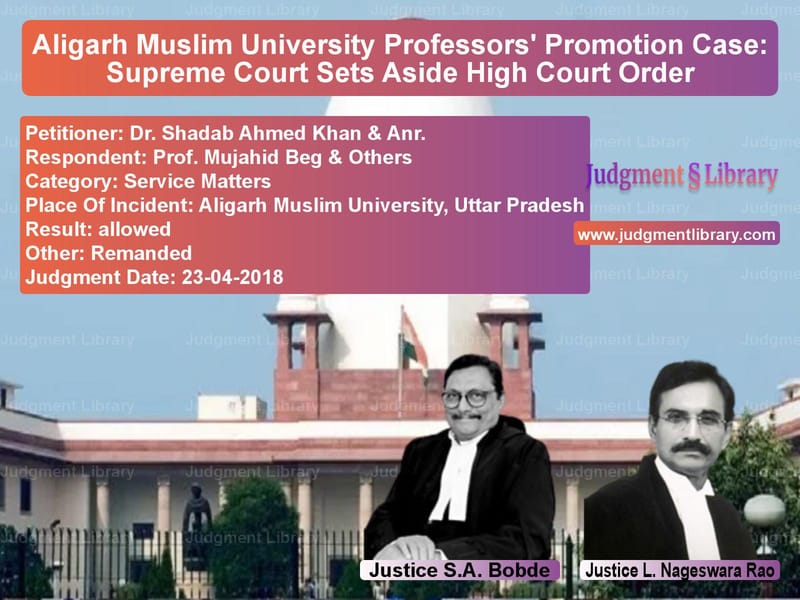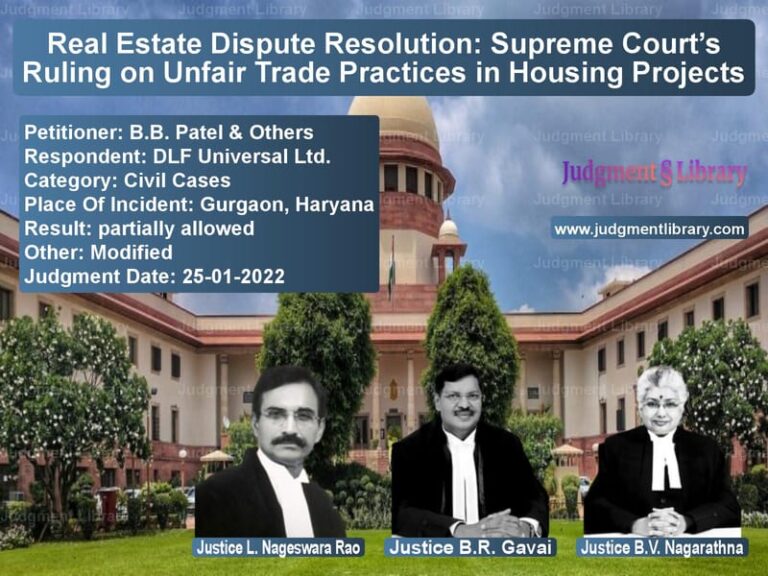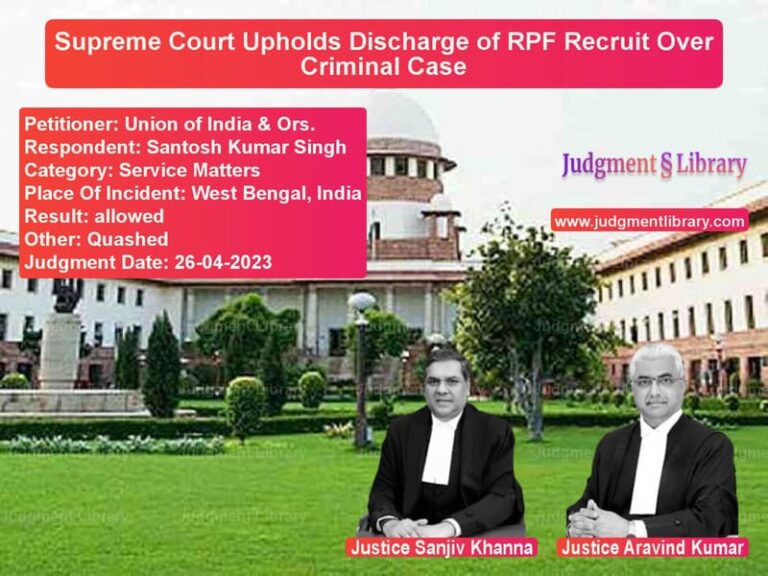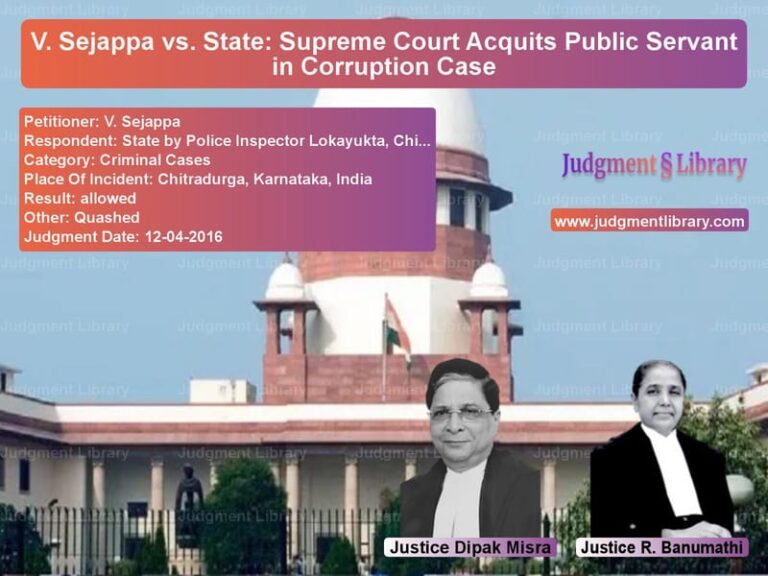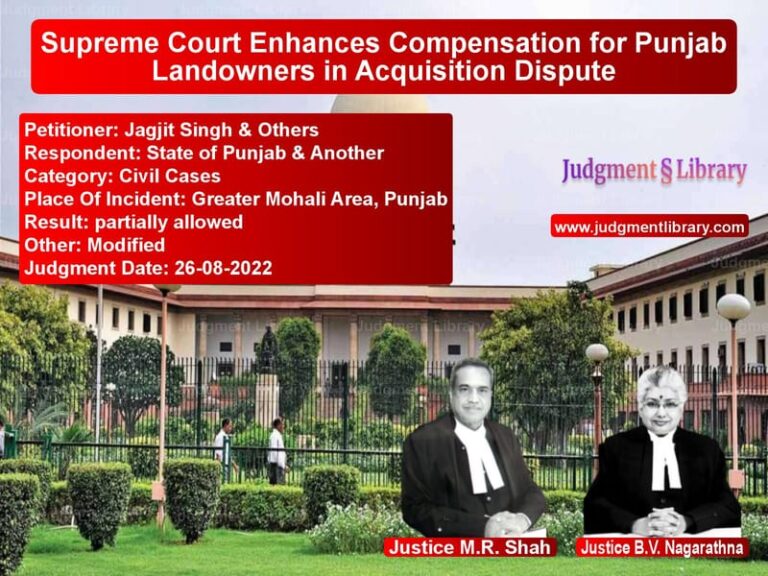Aligarh Muslim University Professors’ Promotion Case: Supreme Court Sets Aside High Court Order
The case of Dr. Shadab Ahmed Khan & Anr. vs. Prof. Mujahid Beg & Others pertains to the promotion of medical faculty members at Aligarh Muslim University (AMU) under the Career Advancement Scheme. The Supreme Court had to determine whether a Ph.D. qualification was mandatory for promotion to the position of Professor in a medical college.
The ruling clarified the applicability of University Grants Commission (UGC) regulations and Medical Council of India (MCI) guidelines for faculty members in medical institutions. The Supreme Court set aside the High Court’s decision, which had held that Ph.D. was a mandatory qualification for promotion under the Career Advancement Scheme.
Background of the Case
The appellants, Dr. Shadab Ahmed Khan and Others, were promoted as Professors in Jawahar Lal Nehru Medical College, AMU, based on recommendations of the General Selection Committee. Their promotions were challenged by Prof. Mujahid Beg, who argued that they lacked the required Ph.D. qualification and, therefore, were ineligible for promotion.
The High Court of Allahabad ruled in favor of Prof. Mujahid Beg, holding that a Ph.D. degree was a necessary qualification for promotion to Professor, as per UGC regulations. Consequently, the promotions of Dr. Khan and others were set aside, and they were ordered to be reverted from the post of Professor.
Aggrieved by this ruling, the appellants, AMU, and Dr. Shahzad F. Haque (another affected faculty member) challenged the High Court’s decision in the Supreme Court.
Key Legal Issues
- Whether Ph.D. was a mandatory qualification for promotion to Professor in a medical college under the Career Advancement Scheme.
- Whether UGC regulations or MCI guidelines applied to faculty members in medical institutions.
- Whether the High Court erred in setting aside the appellants’ promotions without considering all aspects of the case.
- Whether Clause 12 (19) of AMU’s ordinances correctly interpreted the qualification requirements for medical faculty promotions.
Arguments by the Appellants (Dr. Shadab Ahmed Khan & Others)
- The appellants contended that medical faculty members were governed by MCI guidelines, not UGC regulations, which meant a Ph.D. was not required for promotion.
- They argued that AMU’s ordinances explicitly stated that faculty members in the medical field must possess qualifications prescribed by the MCI, which only required an MD/MS degree for Professorship.
- They asserted that the High Court’s interpretation of Clause 12 (19) was incorrect and ignored the autonomy granted to medical institutions in determining qualifications.
- They pointed out that the UGC itself had clarified in a later affidavit that MCI regulations, not UGC rules, governed medical faculty promotions.
Arguments by the Respondent (Prof. Mujahid Beg)
- The respondent argued that UGC regulations applied to all universities, including AMU, and mandated a Ph.D. qualification for Professorship.
- He contended that AMU had amended its ordinances to align with UGC guidelines, thereby requiring Ph.D. as a minimum qualification.
- He maintained that allowing faculty members without a Ph.D. to be promoted would compromise academic standards.
- The respondent further argued that the appellants had been promoted despite lacking the required qualification, which rendered their promotions invalid.
Supreme Court’s Observations
The Supreme Court reviewed the legal framework and made the following key observations:
- AMU is a central university governed by the Universities Act, 1920, and its service conditions are regulated by its own statutes and ordinances.
- The UGC regulations apply to university faculty members, but Clause 1.1.1 of the 2010 UGC Regulations clearly states that medical faculty must follow norms prescribed by the Ministry of Health and Family Welfare.
- Clause 12 (19) of AMU’s ordinances specifies that medical faculty members should meet MCI-prescribed qualifications, which require an MD/MS degree and not a Ph.D.
- The High Court’s reliance on UGC regulations was misplaced, as it ignored the MCI framework applicable to medical faculty members.
- The Supreme Court found that the UGC’s affidavit before the High Court had contributed to confusion by initially asserting that Ph.D. was required and later correcting its stance to align with MCI norms.
Final Judgment
The Supreme Court set aside the High Court’s order and reinstated the promotions of the appellants. The key directives were:
- The requirement of Ph.D. for Professorship in a medical college was held to be incorrect.
- The promotions of Dr. Shadab Ahmed Khan and others were reinstated.
- The matter was remanded to the High Court for consideration of any remaining issues raised by the respondent.
- The Supreme Court directed that future disputes regarding medical faculty promotions should adhere to MCI regulations.
Legal Significance of the Judgment
This ruling clarifies the application of qualification requirements for medical faculty members. The judgment establishes that:
- MCI regulations govern medical faculty qualifications, and UGC norms do not override them.
- University ordinances must be interpreted in line with the applicable regulatory body’s guidelines.
- Ph.D. is not mandatory for promotions in medical colleges if MCI regulations do not prescribe it.
- Judicial decisions must ensure consistency between university regulations and national guidelines.
Impact on Future Cases
The Supreme Court’s decision sets an important precedent for medical faculty appointments and promotions across India. It ensures that universities adhere to MCI regulations and that faculty members are not denied promotions due to incorrect application of UGC norms. This ruling provides clarity on service conditions for medical educators and reinforces the legal distinction between different regulatory frameworks governing educational institutions.
Petitioner Name: Dr. Shadab Ahmed Khan & Anr..Respondent Name: Prof. Mujahid Beg & Others.Judgment By: Justice S.A. Bobde, Justice L. Nageswara Rao.Place Of Incident: Aligarh Muslim University, Uttar Pradesh.Judgment Date: 23-04-2018.
Don’t miss out on the full details! Download the complete judgment in PDF format below and gain valuable insights instantly!
Download Judgment: Dr. Shadab Ahmed Kha vs Prof. Mujahid Beg & Supreme Court of India Judgment Dated 23-04-2018.pdf
Direct Downlaod Judgment: Direct downlaod this Judgment
See all petitions in Promotion Cases
See all petitions in Public Sector Employees
See all petitions in Judgment by S. A. Bobde
See all petitions in Judgment by L. Nageswara Rao
See all petitions in allowed
See all petitions in Remanded
See all petitions in supreme court of India judgments April 2018
See all petitions in 2018 judgments
See all posts in Service Matters Category
See all allowed petitions in Service Matters Category
See all Dismissed petitions in Service Matters Category
See all partially allowed petitions in Service Matters Category

